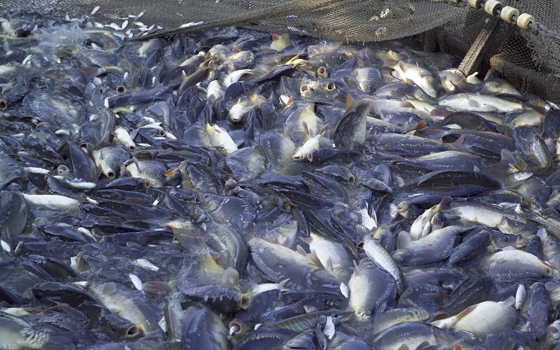The government’s recent commitment of more than $1.3bn to the Omani fisheries sector is the latest step in a series of investments that will lay the groundwork for growth in the industry and open the door for new opportunities for private businesses.
Fish production has increased in recent years, rising to 191,000 tons in 2012, a 21% jump over 2011, and bringing in revenues of OR142m ($369m), according to the Ministry of Agriculture and Fisheries Wealth (MAFW).
The goal of the government’s investments is to create an industry that can meet the demand of the local market while also boosting fish exports, the value of which stood at around $95m in 2012, UN data show. The core elements of these investments are the construction of ports and processing facilities throughout the Sultanate.
One of the central components of the plan is the creation of a port and processing centre in Duqm, which is set to be the largest processing facility in the Middle East. While bids for the construction of the port have already been submitted, Hamed bin Said Al Oufi, the under-secretary for fisheries wealth at the MAFW, said that work on the processing facilities has yet to begin.
“As soon as we have the fisheries port contracted, we will start floating the tender for the industrial estate, as the two projects will go hand-in-hand,” he told The Times of Oman.
By establishing modern ports across the Sultanate, the government is also making efforts to ensure that many coastal cities are included in the development of the industry.
“By 2020, there will be 31 fishing ports in all. Each will have land available for investors to set up their own projects. As of now, Oman has 21 ports. The construction of four new ports will begin soon, and six more are in design, tender and other stages,” added Al Oufi.
In addition to these infrastructure investments, the partially state-owned Oman Fisheries Company (OFC) has committed significant resources to establishing new processing plants, expanding its fishing fleet and building ties with independent fishermen.
OFC announced it would build processing plants in Duqm and Barka, each with a capacity of 35 tons per day, while facilities already under construction in Salalah and Soqrah will be operational by next season. The company also has plans to develop a black tiger shrimp farm, for which it is seeking a strategic partner, according to Mohammed bin Hamad al Masrouri, chairman of the board.
Fleet expansion is part of OFC’s strategy, having recently obtained approval from the MAFW to add 24 ships to its fleet, which the company has said could eventually grow to close to 100 vessels.
While investments from the state and private enterprises will likely lead to higher capacity and output in the coming years, addressing several issues could help ensure that these gains are sustainable and have a positive impact on the estimated 36,000 citizens employed in the industry.
Oman’s coastal cities have a long tradition of fishing and it is a key economic resource for many communities. However, some of the techniques used are centuries old.
OFC recognizes this issue and has taken steps such as providing ice to independent fishermen as well as interest-free loans for the purchase of boats, engines and other equipment.
Storing more frozen fish could also help boost exports. In recent years the MAFW has limited foreign sales of certain types of fish during the summer months, when rough seas discourage fishermen and domestic demand rises.
OFC sought to mitigate this problem in 2013 by building up a reserve of frozen fish in the months leading up to the summer. If successful, this type of program could reduce export restrictions.
By announcing its continued commitment to developing the fisheries industry, the government has helped ensure that the sector will continue to be an important part of the Sultanate’s future. Following the completion of the infrastructure upgrades over the coming years, commercial fisheries in Oman should see strong increases in harvesting and processing capacity, with potential investment opportunities in all aspects of production.
Oxford Business Group
5 July























































